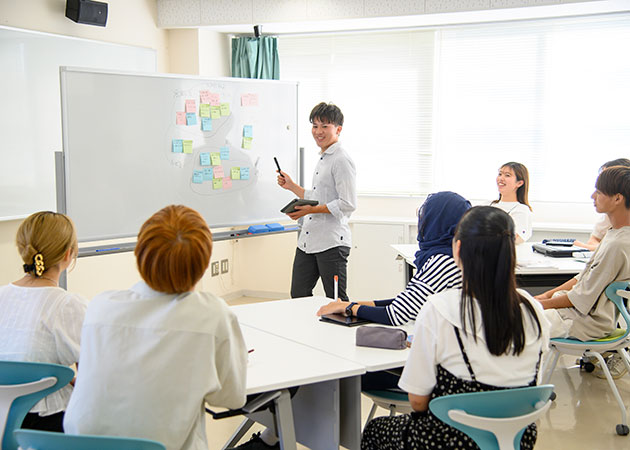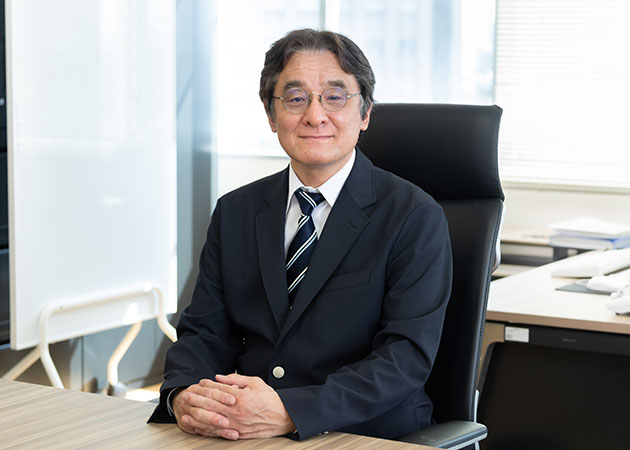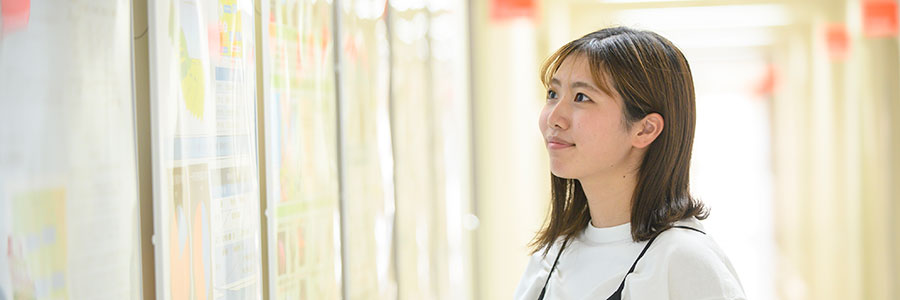
Educational Goals
We aim to cultivate individuals who possess the practical, comprehensive skills needed to explore and address the complex issues faced both by regional communities and the international community, and who will lead the creation of local communities and contribute to the development of a globalized society.
Our goal is to equip students with the ability to explore potential solutions for various interrelated challenges at the local, national, and global levels, such as globalization, declining birth rates and aging populations, deterioration of community functions, and destruction of the natural environment, and to develop the ability to establish a vision for the creation of new societies and regional communities.

Message from the Dean
The Future-Oriented Global Focus Woven Into the Fabric of the Region
It was toward the end of the 19th century, as countries in Western Europe and North America engaged in worldwide economic competition, when a Japanese silk fabric called Habutae emerged as a product on the global stage. This region — modern-day Fukui — soon became a leading producer of Habutae silk.
The people of Fukui were quick to catch wind of information from around the world, and worked to improve their technology through what they could learn from leading producers. These great efforts contributed to the development of the region.
Fukui went on to be known as the “land of textiles” for many years. However, textiles were far from the only industry here that targeted the global market.
It is against this historical backdrop that we work to create a lively, spiritually rich society rooted in the region, while simultaneously keeping abreast of worldwide trends and interacting with people from different cultures, with different values. This is our mission, at the School of Global and Community Studies.
OKAZAKI Hideichi
Dean of the School of Global and Community Studies
Policies

Admissions Policy
The Types of Applicants We Seek
- Applicants should be interested in the complex issues that arise from globalization, from the local region to the international community, and have a willingness to explore these issues deeply, and to work independently to solve them.
- Applicants should be willing to study specialized fields as necessary to investigate and solve problems, and have a positive attitude toward practical work involving problem-solving methods and collaboration with others.
- Applicants should be motivated to acquire the communication skills needed to play active roles in a multicultural global society — including communicating in English as an international language — and willing to engage with other people in conversation as part of broadening and deepening their activities.
Curriculum Policy
- Students are to acquire a broad range of knowledge in the humanities and social sciences, including political science, economics, business administration, sociology, history, religion, philosophy, and cultural studies, as well as fundamental knowledge of natural sciences, in order to understand and analyze the various issues faced by both regional and international society today.
- Students are to acquire the ability to investigate and solve real-world issues facing the region and society, by working with the community, businesses, and other local bodies, in addition to specialized studies.
To this end, students are also to acquire the skills necessary in statistics, data processing, and survey methods they will need as analytical tools. - Students are to acquire the cross-cultural understanding and communication skills necessary for life in a globalizing society and region, with a broad awareness of the world, to live independently in such a multicultural environment.
Diploma Policy
- Graduates are to possess a broad range of knowledge and skills, both in the liberal arts and specialized fields.
- Graduates are to be able to investigate and research the issues and development potential of both regional and international society, and to contribute to developing global society and building regional communities by solving these issues and achieving this potential.
- Graduates are to acquire the international perspective and critical thinking skills demanded by a globalizing society, with cross-cultural understanding and communication skills for multicultural environments — including proficiency in English and other foreign languages — to address the needs of, and play active roles in, government, business, and the community.





